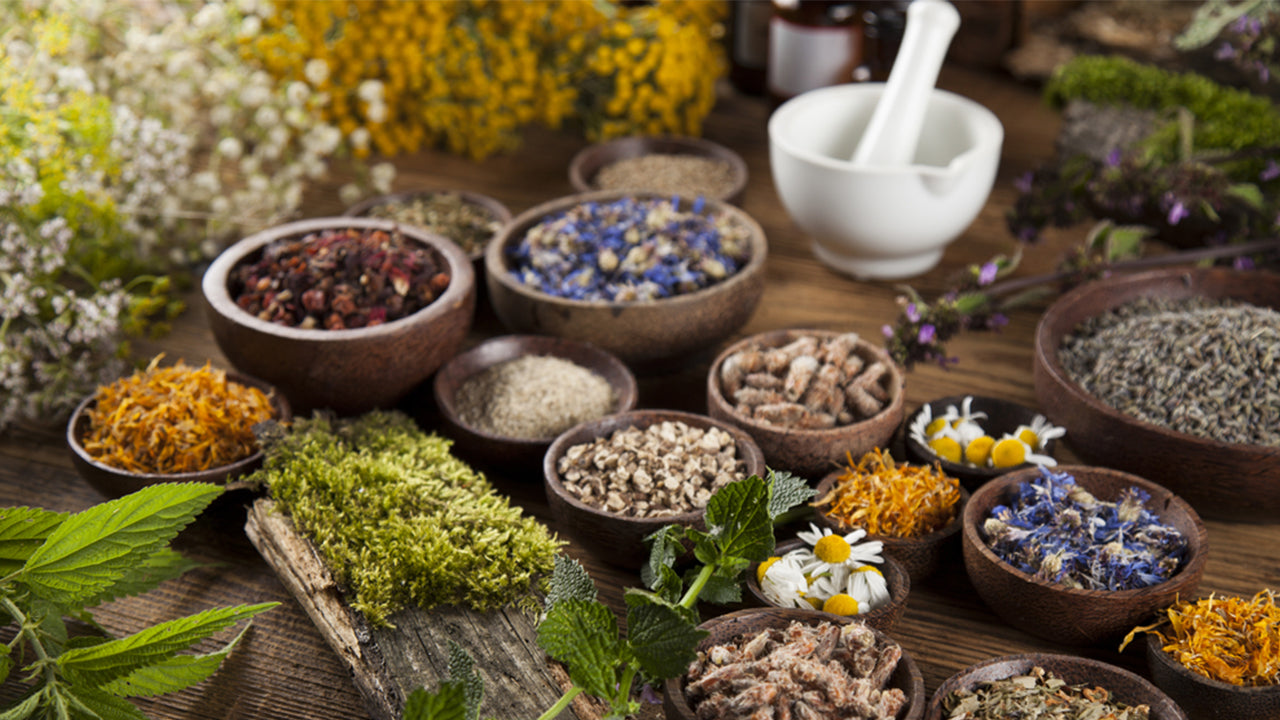Heal Faster with Natural Remedies for Cold and Flu
 By: by Amino Science
By: by Amino Science

Even with the best of intentions, it's not easy to avoid contracting the cold or flu. And with so many health aids out there, choosing the best remedies for flu and cold relief can be a hassle. Although conventional methods for flu and common cold treatment are more prevalent, consider trying less toxic natural remedies for cold and flu. The following tips will help prepare you to de-stress your next distressing bout with these contagious bugs.
Immune System Attack
When influenza, more commonly known as “the flu,” attacks, the body expresses one or more of the following symptoms a few days after exposure: muscle pains, body aches, fatigue, fever, sore throat, runny nose, sneezing, headache. Symptoms for the common cold are not as severe but may take longer to subside. The flu takes approximately one week to run its course, while cold symptoms could last as long as two to three weeks. Influenza is particularly alarming, because many people die from complications associated with the illness. Like most viruses, influenza is generally spread by coughing and sneezing.
Conventional Cures
Treating your illness can be as easy as a trip to a local drugstore and popping pills every few hours. As tempting as this may sound, choosing synthetic treatment options over natural remedies comes at a cost to your immediate and long-term health.
Antibiotics vs. Antiviral Drugs
The common cold and the flu are viral infections rather than bacterial infections, so antibiotics do not prevent the spread of these viruses. However, inflammation symptoms can occur as a result of influenza virus infection. Antibiotics can be effective when treating symptoms like inflammation, sinusitis, and ear infections. Antibiotics destroy the target pathogen. Antiviral drugs inhibit pathogen development, which helps to stop the spread of the flu bug and lessens viral potency.
If antibiotics are not administered properly and sparingly, pathogens mutate and yield antibiotic-resistant bacteria. This means that each time you take antibiotics, you run the risk of attacking the antibiotic-sensitive bacteria while the antibiotic-resistant strains remain and spread in your body. Additional side effects include diarrhea, nausea, and allergies. Antiviral drugs come with a slew of side effects as well, including diarrhea, mood changes, nausea, vomiting, stuffy nose, and runny nose.
Aspirin
Analgesics like aspirin relieve mild or chronic pain and reduce inflammation and fever. Aspirin, also known as acetylsalicylic acid (ASA), is a potent over-the-counter drug, and it is one of the most widely used medications in the world. Approximately 50 to 120 billion pills are consumed each year. Side effects from aspirin use may include upset stomach, stomach bleeding, stomach ulcers, and aggravated asthma.
Acetaminophen
Like aspirin, acetaminophen is a common over-the-counter medication and is sold in assorted dosages. Acetaminophen treats fever and pain symptoms. Drug side effects include liver failure and skin rashes.
Flu Vaccine
Influenza vaccines, or flu shots, are only effective against particular strains of the virus, and vaccines are updated every so often in reaction to viral strain changes. The vaccines contain preservatives and chemicals that can cause harm in addition to the allergies, fever, and stomach complications people commonly experience as side effects.
Natural Remedies for Cold and Flu
Pondering the side effects associated with synthetic treatments for cold and flu is motivation to explore natural preventive measures against illness, and to devise your own home remedies for flu and cold. Once you discover the assorted natural medication options, put your creative healing powers to the test.

Antiviral Herbs
Mother nature offers many potent natural remedies for cold and flu. Here are a few of our favorites to keep in your medicine cabinet.
Elderberry
This super berry possesses antiviral properties that inhibit viral strength and development. Boost your immune system by taking elderberry when you first experience flu or cold symptoms. Elderberry has anti-inflammatory and antimicrobial properties. Taken daily, this herb deters a gamut of illnesses. Soak the elderberry flowers in water and drink as a tea. Crush the berries and mix with food or your favorite drink.
Echinacea
This common cold and flu preventive supports respiratory health, which both illnesses tend to compromise considerably. It contains the compound echinacein, a natural bacteria and virus inhibitor. Echinacea also impedes inflammation and alleviates pain. Crush and steep echinacea root in hot water and enjoy as a tea.
Calendula Flower
This antiviral herb fights infection and alleviates inflammation when applied topically as an oil. Slowly heat crushed dry calendula leaf in a carrier oil (like coconut oil or jojoba oil) for several hours. Let cool and then soothe affected areas.
Olive Leaf
Olive leaf attacks viruses that spawn respiratory infections, like the common cold or influenza. Additionally, it defends the body against lethal disease-causing pathogens, including malaria, tuberculosis, pneumonia, and meningitis. The olive leaf extract is effective when infused in olive oil and ingested as drops.
Oregano Oil
This antibacterial powerhouse alleviates inflammation and treats viral as well as bacterial infections. Take 2 drops of concentrated oregano oil daily. Increase dosage as needed to ward off infection. Source a reputable oregano oil supplier that manufactures a potent and pure laboratory-grade extract.
Vitamins
By all means take a multivitamin daily, but when you're battling the cold and flu an extra dose of the following vitamins can only help.
Vitamin C
Vitamin C, or ascorbic acid, should be taken daily, up to 1,000 milligrams. Increase your dosage to no more than 4,000 milligrams if you contract the cold or flu. Vitamin C stimulates your body’s white blood cells, or leukocytes, which are disease-fighting cells of the immune system.
Vitamin D
Otherwise known as the sunshine vitamin, vitamin D is difficult to synthesize for many people who do not receive an abundance of sun. Vitamin D aids in the absorption of minerals essential for fighting disease. Your body produces vitamin D naturally with regular sun exposure. Take 2 to 4 drops of liquid vitamin D daily if your levels of this essential natural remedy are low.
Zinc
Zinc should be taken at the first sign of the common cold or flu. However, inject zinc supplements sparingly, using no more than 100 milligrams daily. Opt for a daily intake of zinc-rich foods, such as eggs, beans, nuts, and whole grains.
Essential Oil Treatments
When experiencing cold or flu symptoms, inhale oil-infused vapors for decongestion and topically apply essential oil mixtures to alleviate muscle aches and pains. Purchase pure organic essential oils for best results. Diffuse, vaporize, or infuse a mix of 3 to 5 drops of your preferred oil to treat your cold and flu symptoms.
- Clove is a natural antiviral and antimicrobial essential oil. Infuse with a carrier oil and water before applying as a compress to assuage headaches.
- Peppermint is great for treating your cough and decongesting air passages. Apply with a carrier oil to the less sensitive areas of your body, or vaporize your room using a few drops of this strong oil.
- Eucalyptus oil is a natural antiviral remedy. Use this essential oil with steam to address congestion symptoms naturally.
- Pine is a treatment for your sore throat and neck symptoms. It also lessens congestion.
Take care when using essential oils. Even diluted oils can induce allergic reactions. Gradually incorporate these oils into your cold and flu prevention strategy. Test a patch area on the body before using these oils liberally. Avoid direct contact with sensitive areas of the body, such as the groin, eyes, nose, and mouth. You should not swallow essential oils intended for topical use, and do not apply edible oils to the skin. Essential oil side effects include severe allergies, rashes, swelling, and behavioral changes.
Age-Old Wellness Hacks
These are the good-ole cures your mom healed you with when you were a child, and they're as helpful now as they were back then!
Gargle with Salt
A salt water tincture can help soothe a sore throat by subduing inflammation and easing respiratory distress by loosening up all that thick mucus.
Add half a teaspoon of salt to an 8-ounce glass of warm water and gargle for a few seconds before spitting out.
To add to salt's healing wonders, it can also be used as a saline flush to clear sinuses. You can make a homemade and highly effective nasal spray by adding a half teaspoon salt to a Neti pot of warm filtered water to help clear your sinuses of mucus and bacteria.
Sip on Chicken Soup
Research shows chicken soup is a clear winner for cold remedies. It's a natural anti-inflammatory, and can help get rid of mucus and stubborn nasal congestion. Make sure you have chicken soup on hand this flu season, and add healthy vegetables like onions, sweet potatoes, parsnips, turnips, carrots, and celery!
Supplement with Zinc Lozenges
This immune system strengthener is a common cold remedy found in medicine cabinets across America. Science shows that it can significantly reduce incidences of upper respiratory tract infections in young children, and can cut your chance of contracting a cold by as much as 50%! You have to use it quick though—within the first 24 hours of cold symptoms for it to do the trick.
Get Well with Ginger
Ginger root and ginger tea are equally effective flu remedies. Ginger contains anti-inflammatory gingerols and shaogals that can take the sting out of a scratchy throat, and ginger is famously know for its stomach-soothing super powers.
Chop up a 1- to 2-inch piece of ginger root and add it to a cup of boiling water to make fresh ginger tea. Let it steep for 5 to 10 minutes, strain and enjoy. Turn it into even more palatable ginger lemon water by adding honey and lemon, two other cold busters!
Take an Essential Amino Acid Supplement
Daily supplementation with essential amino acids helps to keep your heart and muscles healthy and your immune system strong. Amino acids are exceptional because they can be formulated to target specific health needs, like endurance, performance, and recovery. You can shop Amino Co's trusted essential amino acid blends here.
Prevent Illness Naturally
In addition to incorporating natural remedies for cold and flu into your prevention routine, be sure to review lifestyle basics to ensure your good health. Stay hydrated to flush out toxins that invade the body, and enrich purified water naturally with antioxidant black and green teas. Get enough sleep so that you feel rested; lack of sleep and oversleeping can make you susceptible to illness. Incorporate antiviral food elements, like ginger, garlic, and onions, into your real-food dishes daily, avoiding harmful preservatives.
Be mindful of your sugar intake, as it can inhibit your body’s ability to fight cold and flu naturally. If possible, ditch the sedentary life. Maintain healthy lymphatic and circulatory systems with frequent walks and detoxifying yoga stretches. Torso stretches are great for expanding air passages for all that fresh air you should take in regularly.
Consult your doctor for proper diagnoses and dosage recommendations, especially if you are pregnant, taking other medications, or your immune system is compromised due to pre-existing conditions.

Up to 25% off Amino
Shop NowTAGS: conditions natural cures
Join the Community
Comments (0)
Most Craveable Recipes




 833-264-6620
833-264-6620



















